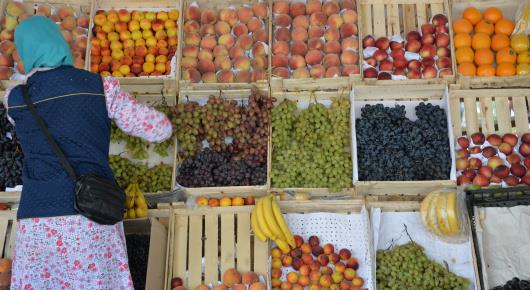Astana Economic Forum sheds light on food security and nutrition

In response to the growing challenges of rising hunger and malnutrition due to continuous conflicts and the effects of climate change, considerable efforts are required to strengthen partnerships in food security and nutrition among developed, transition and developing countries.
Kazakhstan, having committed to ensuring food security in Central Asia and having established the Islamic Organisation for Food Security, headquartered in Nur-Sultan, is already among the leading countries in this vital area.
This was one of the key messages delivered today at the Astana Economic Forum by Nabil Gangi, FAO Deputy Regional Representative for Europe and Central Asia. The Astana Economic Forum, held yearly in Kazakhstan, gathered delegates from approximately 100 countries to this year’s event, the theme of which was “Inspiring Growth: People, Cities, Economies.”
Gangi acknowledged the progress made by many countries, noting their political will on the path to “zero hunger.” He also outlined FAO’s vision of maintaining substantial rates of hunger reduction and, ultimately, eradicating hunger by 2030, in accordance with the Sustainable Development Goals.
The Deputy Regional Representative praised the achievements of Kazakhstan in the areas of food security and nutrition. Since 1990, the country has kept the total proportion of undernourished at less than 5 percent of the population.
“The countries in transition, and Kazakhstan among them, provide an example for fast economic growth and agricultural development due to increased investment, strong commitment and political will,” Gangi said. “These efforts should serve as an incentive and can be adapted for use elsewhere in the region. FAO actively assists countries in sharing experience and knowledge.”
Kazakhstan is the main producer and exporter of grain and flour in Central Asia and thus makes a significant contribution to ensuring food security in the region. The country is also an active member of the Eurasian Economic Union, aiming for food security.
Since 2014, FAO has supported the country in creating legislative and institutional frameworks, mechanisms and systems for successful organic production to supply the domestic market. Organic food is in demand worldwide, and strengthening the exports of such products – including grain, legumes, meat and meat products – offers the prospect for Kazakhstani farmers to improve their livelihoods and to further invest in their farms.
“Governments must play a central role in creating a rural infrastructure and a favorable investment environment,” Gangi said.
Equally important priorities in Kazakhstan are transition to digital, green, climate-smart and other modern agriculture technologies to increase production, improve the resilience of farmers to climatic shocks such as floods and droughts, and contribute to reversing the degradation of soil and of the environment as a whole.
The round-table discussion “Digital agriculture: from precise farming to ‘smart farms’” took place earlier during the forum, where Kairat Nazhmidenov, Officer-in-Charge in Head of the FAO Partnership and Liaison Office in the Republic of Kazakhstan, and Gerald Herrmann, director of Organic Services, presented FAO’s work.
FAO has participated several times in the annual event. In 2015, the overarching issue of food security was included in the forum’s agenda, when FAO Director-General José Graziano da Silva addressed participants. Food security and safety was a key topic in 2017, through the prism of organic agriculture development in Kazakhstan.
The partnership of FAO and Kazakhstan builds on the basic cooperation agreement that defines their joint priorities in the area of food security and safety. The document was ratified by the Kazakh Parliament and signed by the president in 2018. Kazakhstan and FAO have been working together since the country became a member of the Organization in 1997.
17 May 2019, Nur-Sultan, Kazakhstan
